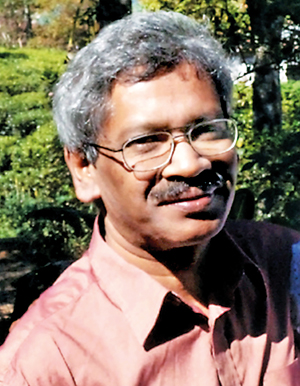Leelaratne’s literary body, a contribution to reconciliation
Trilingual author Upali Leelaratne carried away the award for the Best Translation of Short Stories at the recent State Literary Awards ceremony having won the Award for the same category last year as well. It is a singular literary achievement for he was also the first award winner of Tamil to Sinhala translations.

Upali Leelaratne
This year’s award winning translation – “Aluth Manalaya,” is a collection of short stories on the life of upcountry plantation workers where he takes readers through their ardous lives – living in line rooms, plucking leaves from the lush tea bushes in inclement weather and competition during weighing of the harvest as well as light-hearted moments in the estate classrooms or out on the rough terrain.
Leelaratne, himself lived his childhood years among the children in estates of Talawakelle and has a deep understanding of their needs, aspirations and the simple joys through their poverty and suffering. It is commendable that his focus on them in this age of reconciliation, has been rewarded.
Born in Ahangama, in the deep south, Leelaratne was an infant when the family moved to Talawakelle with his father’s appointment as a machine operator in a printing press. With his new home bordering several tea plantations, his playmates were Tamil children with whom he spent most of his time. Although Leelaratne did not study Tamil while at Sumana Maha Vidyalaya in Talawakelle, through his close association with Tamil friends, he began reading Tamil books. He exchanged books with his friends, borrowed books from Tamil school libraries and later learnt to write in Tamil as well. These were the 1960s when he had Tamil, Muslim and Sinhala friends with whom he communicated in both languages and lived in harmony free of communal conflicts.
Leelaratne hastened to add that although school libraries on the estates had books of literary value which he accessed, among the plantation workers who were mostly illiterate, there were no literary inclinations. What were widely circulated were cheap, colourful, illustrated romantic stories.
Given the extreme poverty most faced, the Talawakelle Municipal Council, each year, distributed school text books free of charge to students – a step that made children attend schools and took them away from pulp literature.
Although his link with the plantations ended at grade 7 when he won a scholarship to study at Nugawela Madhaya Maha Vidyalaya in Kandy, the impact of Talawakelle lasted. He has translated 30 Tamil novels of South Indian, Jaffna and Colombo authors. He entered journalism when he translated Tamil articles and political writings of Jaffna newspapers. He also wrote eight Tamil novels where he brought out the realities he was familiar with, the values that existed with real characters he knew on the estate enacting them. Some of his stories did have political connotations like when he wrote about the destruction of the Jaffna library and satires on government bungling bringing out the absurdity and sensitivity of the situations. This year, he also had his “Vathukaraye Demala Keti Katha” among the books nominated for an award when his translation, “Aluth Manalaya,” written by M. Sivalingam, carried away the award.
Leelaratne gained international recognition when his translated novel “Galanguru” won him the “Nalli Desai” award. It was awarded in 2010 by the famed “Surangam” – a book published in Tamil Nadu in eleven languages. “Galanguru” was a translation of a novel of Sinnappa Bharathi, a trade unionist and novelist of Tamil Nadu. Leelaratne had translated six out of his ten novels and was the only Lankan writer to win an award.
It was also in 2010 that he, for the first time, translated a collection of short stories titled, “Periyathambige Thith Eluwa” based on estate life and was nominated for a State Literary award which inspired the writer to take to pen. His “Kedeli Bindi Giya Pasu” however, was a collection of short stories written by migrant Tamils from Jaffna and Colombo and published in the book titled “Gnanam” authored by Dr. T. Gnanasekeran. The stories which are expressions of feelings for the mother country and yearning for a past that enriched their lives, won him the State Literary Award last year. Earlier, he translated a Tamil novel of Jeevakumaran – a migrant of Jaffna domiciled in Denmark titled “Sangani Chandiya.” He also wrote “Komathi” based on a LTTE woman rebel.
Leelaratne says that migrants are grateful to him for translating their writings. They want people back home to know that they treasure the traditions that enriched their lives and their love for the country they left behind. The translation made it possible for them to convey this message to those in Sri Lanka. These migrant writers visit Leelaratne whenever they arrive in Sri Lanka, buy the books in bulk and distribute them in Sinhala schools free of charge.
The two-time national award winner is attached to the Publication Department at “S. Godage and Brothers” and being proficient in all three languages, had been for 32 years in charge of printing of school textbooks.


